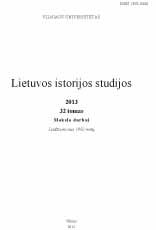DUBINGIŲ MIKROREGIONO EKONOMINĖS RAIDOS I AMŽIUJE–XVI AMŽIAUS VIDURYJE SPECIFIKA
Specificity of the Economic Development of the Dubingiai Microregion in the 1st – the middle of the 16th Century
Author(s): Rimvydas LaužikasSubject(s): History
Published by: Vilniaus Universiteto Leidykla
Summary/Abstract: Lifestyle, trades, customs of peasants in the prehistoric period and in the times of the Grand Duchy of Lithuania have been within eyeshot of chroniclers, economists, historians, archaeologists for already hundreds of years, but in the context of the research presented in this article we can define several scientific problems that are still left unsolved. Economic development in the 1st–16th centuries has not been systematically analysed until now. In the investigation of economic development in the prehistoric and the early statehood periods, mostly due to the lack of sources, the view is upheld that the economic life of the people who lived in all the present territory of Lithuania in the times of prehistory and early statehood was more or less the same, i.e. as described in the early written sources of the 9th–13th centuries about the littoral (western) Baltic tribes or Jatvingians. In the cases when regionalism is singled out in historical investigations, territorial boundaries of archaeological cultures rather than economic logic are followed. These boundaries are more cultural–political and quite often based on the research of one type of archaeological monuments. In such a way, the “net” economic regionalism that existed in the present territory of Lithuania and that depended on the soil fertility, possibilities of business connections, population density and similar factors is ignored to some extent. The research object presented in this article is the economic development of the microregion in the context of general economic development. The research objective is to highlight the economic development specificity of the Dubingiai microregion and to formulate hypotheses for the further empirical studies of the microregion. Ilya Prigogine’s systems theory and the attitude towards the exceptional importance of economic conditions for social development, which was characteristic of the Neo-Marxist philosophy, were chosen as the theoretical bases of the research. When discussing the economic development of the microregion, we should single out at least three kinds of economic activities: arable farming, animal husbandry, and other trades (hunting, fishing, crafts, robbery, etc.). The relative influence (the surplus value and significance in the community life) of each of them was different in different periods. Due to the agrarian nature of farming, the agricultural systems in the 1st–16th centuries in Lithuania were considered to be the deciding factor determining the need and possibilities for other economic activities.
Journal: Lietuvos istorijos studijos
- Issue Year: 2013
- Issue No: 32
- Page Range: 33-63
- Page Count: 31
- Language: Lithuanian

